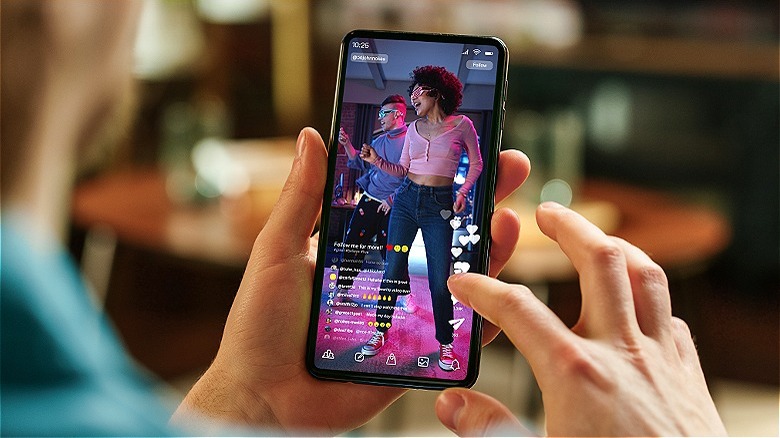Genius Ways To Save Money On Your Phone Bill
Saving on phone bills is something most Americans would welcome for their monthly budgets, as cellphone/smartphone usage has become a way of life. Nearly 90% of Americans use a smartphone today, according to the Pew Research Center. Among these users, the think tank reports 15% of them are "smartphone-only" users, meaning they access the internet through their phones but don't have broadband access at home. This smartphone dependency tends to be common among lower-income households, with 27% of people earning less than $30,000 a year using their phones in this way. This being said, 13% of households with incomes over $30,000 but below $74,999 are smartphone-only households, too. In its survey on home broadband adoption, Pew found that the cost of high-speed internet was the main financial barrier as to why people didn't have the service in their homes.
J.D. Power found the average monthly cellphone bill in 2024 was $141. While cellphone prices are lower than last year ($156), mainly due to competition between mobile network operators, the cost may still be prohibitive for many. In 2020, as per the Tax Foundation, Americans spent an estimated $17.5 billion in fees, wireless surcharges, and state, federal and local taxes. Even though these sorts of costs are impossible to avoid on a full-service phone plan, there are still ways to save money.
Changing your data usage
The first thing you need to do is reassess your current phone plan. Let's start with thinking about the amount of data you use versus what you actually need. According to a study by Ericsson, the average smartphone burns through 21 gigabytes of data every month and is expected to grow to 66 gigabytes with the continued growth of 5G networks. You should check your bill statement for information on data usage and what it's costing you, which will be shown as megabytes (MB) or gigabytes (GB).
If that information isn't readily available or obvious, check your phone's data settings or give your provider a call. While everything you do, including texting, scrolling articles, or watching videos on your phone, can burn through data, data usage isn't equal. Certain activities, such as streaming, cost you a lot more in data usage than, say, sending out a text message. So, check out your data usage and review how you're using your phone to determine if there are habits you can perhaps adjust. Further, make sure "cellular data" is off on your iPhone or "mobile data" on your Android to ensure you'll only connect to the internet if you have a Wi-Fi (that is, free) or wired connection.
Once assessed, you may find you're able to switch to a less-expensive phone plan. Alternatively, if you're using data by the gig and find you're constantly going over, this review of your phone plan and data usage can help you figure out how to stay within range of whatever you've budgeted for your phone.
Switching to a different service provider
Aside from your data plan, let's think about the service provider itself. For potential phone savings, compare what the various providers are offering, including any discounts for signing up. Though, be sure to always read the fine print.
Also, consider if you actually need to service from a giant telecom company like a T-Mobile or an AT&T, or if a smaller alternative provider is a better fit for your needs. For example, mobile virtual network operators (or MVNO) like Republic Wireless or Mint Mobile (which T-Mobile acquired in 2023) work basically as service wholesalers that purchase bulk data from big providers and then parcel it out to people in the market for equivalent service at a discount.
According to research firm MarketsandMarkets, the MVNO market is expected to grow from its current $84 billion to $116.8 billion by 2029, which reflects an obvious interest in these alternate, less-expensive ways of acquiring phone service. In a 2024 survey of 1,072 American cellphone users, YouGov found that three in 10 expressed a desire to switch from big providers to smaller companies for their service needs. Of those most likely to switch, unsurprisingly, 50% named savings as the main reason, with the freedom of a flexible contract coming in second at 45% of respondents.
Opting for a bundled plan
If you live in a household with family or roommates, looking into a bundle plan could be a viable way of saving both you and the other people in your household, well, a bundle. It's not an idea that's unpopular anyway according to a survey conducted by comparison search engine WhistleOut. The survey found that 53% of adults between 18 and 44 years old were still on their parent's phone plans, with 14% to 32% of that carried by the major service providers Verizon, T-Mobile, and AT&T. The obvious reason is that bundle phone plans can save individuals on these plans as much as 50% or more per month.
If we look at a few current plans, T-Mobile Essentials offers up to three phone lines for $120 per month; the plan includes unlimited talk/text, 50 gigabytes of data, no service contract, and unlimited options for 5G or 4G service. That means you and two household members can split a single $90 bill three ways for a $30 monthly phone plan. Verizon's myPlan, meanwhile, offers 5G service for $30 and $55 per line, if you sign up for four lines. For the lowest-cost bundle, customers get basic 5G, with the option of home internet for $40 more a month. Another requirement for the discount is customers must sign up for autopay and paper-free billing.
Paying with a particular credit card
A phone cost that many might not think about is phone damage or theft, or that your credit card might be able to help in both instances. According to Allstate Protection Plans, 78 million Americans damaged their cellphones in 2023, with the most frequently reported issue being damage to their phone screens, followed by Wi-Fi or connectivity issue(s), problems with a phone's touchscreen, loose or damaged charging ports, and water damage.
Depending on which credit card you use to pay for your phone bill, you could have insurance for phone damage/theft. For example, the American Express Platinum card (which has a $695 annual fee) gives cardholders $800 in insurance coverage twice a year with a $50 deductible. For a less upscale option, the Wells Fargo Autograph Visa card has no annual fee and 0% APR for the first 12 months of use. You'll get $600 worth of insurance against theft or damage with a $25 deductible.
Aside from insurance, some credit cards allow you to build points or get cash back on payments made with your card, too. For example, the Chase Freedom Unlimited card pays 1.5% cash back for every dollar you spend on your phone bill. That's like paying yourself to pay your phone bill. Bonus? Making payments with your credit card is also one of the easiest ways to raise your credit score.
Negotiating your contract
Once you've done all your homework and you know exactly what kind of plan you're looking for, you can immediately cancel your service with your current provider, right? Not so fast. If you're on a contract, that escape plan could come with a $50 to $350 fee. While there may be ways to slip out of these contracts with as little damage to your pocketbook as possible (like harassing customer service, finding loopholes in your contract), it might be better to try negotiating from a place of strength.
No business wants to lose a customer if it can be helped, and perhaps by explaining why you're contemplating leaving to a customer service representative, they may find a way to sweeten the deal and keep you. Loyalty programs, special corporate discounts through work, going from paper to digital statements, and even where you choose to bank can bring your phone bill down. Worse-case scenario, if your service provider is unwilling to work with you, there are competitors offering to cover some or all of your cancellation fees. For instance, T-Mobile will cover up to $800 on the remainder of your balance through a prepaid Mastercard for up to four voice lines.





